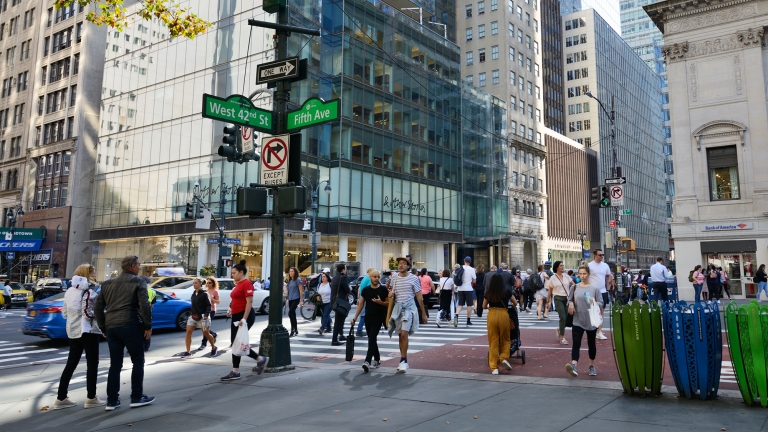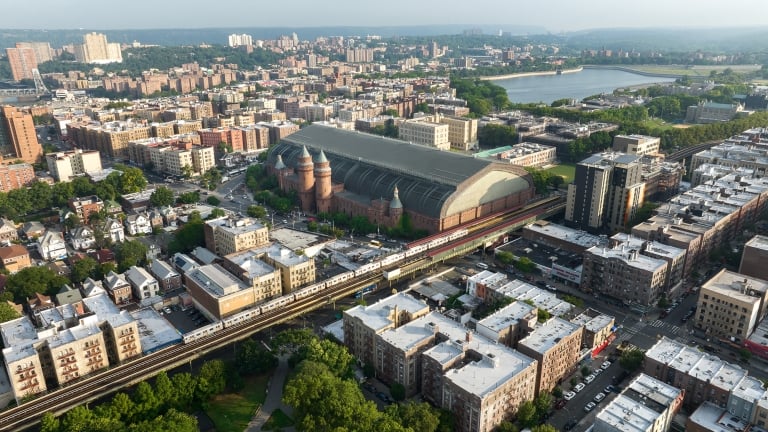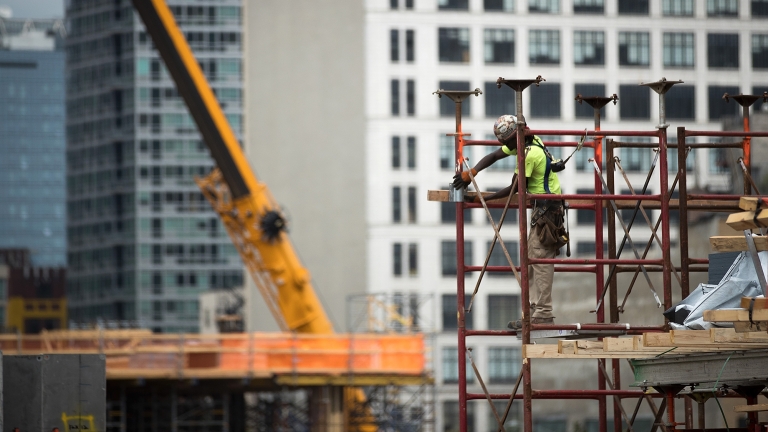See accomplishments and highlights to date within each goal of the Making New York Work for Everyone Action Plan:
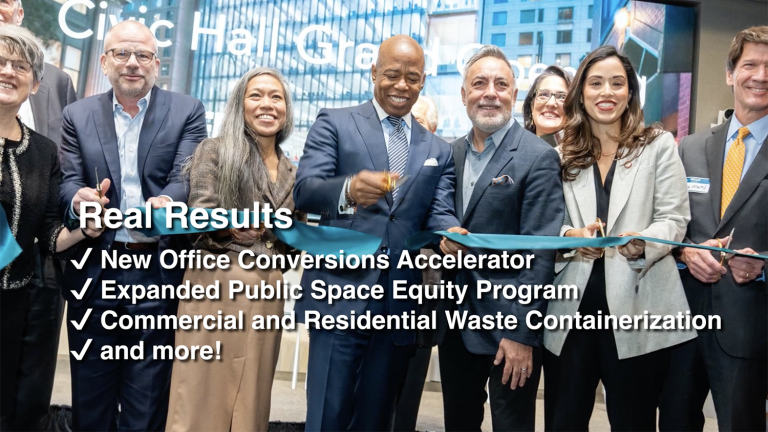
Recapping the milestones, highlights, and progress of the “New” New York Panel one year after the release of the “Making New York Work for Everyone” action plan. View the full playlist.
Goal 1: Reimagine New York’s Business Districts as Vibrant 24/7 Destinations
Reimagining New York’s business districts as vibrant 24/7 destinations means creating flexibility to repurpose space and fill vacancies with a variety of uses; investing in beautiful, permanent public space; improving quality-of-life issues across our business districts, such as sustainability and cleanliness; and offering new reasons to go to business districts.
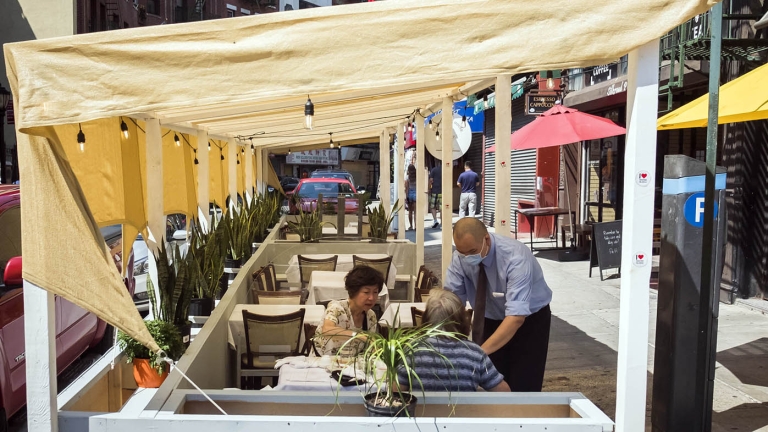
Featured Highlight: Dining Out NYC
The City unveiled New York’s permanent outdoor dining program and the largest outdoor dining program in the nation.
Learn MoreKey Accomplishments:
● $40 million investment in safer, more vibrant Downtown Brooklyn – A City investment delivering streetscape improvements, and transportation and public space upgrades along Fulton Street and across Downtown Brooklyn, including improved bus service, new public art, and pedestrian and roadway user safety enhancements—supporting the continued recovery of Brooklyn's largest economic hub.
● Launched a new Office Conversions Accelerator – A tool to expedite complex office-to-housing conversion projects—speeding up the process of creating new housing while putting millions of square feet of empty offices to better use for New Yorkers.
● Launched NYCIDA Manhattan Commercial Revitalization Program (M-CORE) – A program to provide financial assistance, in the form of tax incentives, to support transformative renovations of aging commercial office buildings located in Manhattan south of 59th Street.
● Broadway Vision Plan Expansion – A new phase in the plan to connect Manhattan’s Flatiron District to Union Square—introducing pedestrian, cyclist, and public space improvements along Broadway from East 21st Street down to Union Square at East 17th Street.
● Commercial and residential waste containerization – Two new rules to require residential buildings and businesses to get trash bags off city streets.
● City of Yes for Carbon Neutrality approved by City Council – The City Council passed a historic set of citywide zoning changes that modernizes the city’s Zoning Resolution to facilitate climate action, clean energy, and resiliency by removing barriers to greener energy, buildings, transportation, and water and waste systems.
● City of Yes for Economic Opportunity approved by City Council – The City Council approved a landmark modernization of the city’s Zoning Resolution to help businesses find space and grow, support entrepreneurs and freelancers, boost growing industries, and enable more vibrant streetscapes and commercial corridors.
● Largest-ever Summer Streets in 2024 – As part of the Open Streets initiative, NYCDOT ran the city’s largest-ever Summer Streets program, opening nearly 20 miles of NYC roadways to pedestrians and cyclists with extended operating hours. These expanded hours built on the 2023 expansion that brought Open Streets to all five boroughs for the first time.
● Highest ever allocation made for NYC cultural institutions – The DCLA’s FY25 budget, at $254M million, was the agency's largest-ever allocation for the agency’s upcoming fiscal year.
● Launched Get Sheds Down initiative – A concrete set of strategies regarding sidewalk construction sheds and scaffolding that will remove these eyesores from city streets more quickly while redesigning and reimagining those that are needed.
Goal 2: Make it Easier for New Yorkers to Get to Work
Making it easier for New Yorkers to get to work means increasing the supply of mass transit options; reducing the demand for cars and trucks; and strengthening employment hubs and workspaces across all five boroughs.
Key Accomplishments:
● Kicked off Blue Highways Alternative Freight Initiative – Through the Blue Highways initiative, the City will activate the robust network of local waterways for the sustainable movement of goods. The City is seeking input from the private sector on how to reactivate waterways for safer, greener freight deliveries.
● Launched Smart Curbs pilot and curb management action plan – A comprehensive effort to reimagine the city's curb space—deploying innovative tools and creative, forward-looking strategies to make the city cleaner, greener, and healthier.
● Historic expansion of New York City's greenway corridors – The City launched a historic expansion of NYC’s greenways—filling gaps in the greenway network beyond Manhattan to create 60 miles of greenway corridors. Through this expansion, the Adams Administration will build more than 40 miles of new protected bike infrastructure and explore improvements to existing infrastructure along the corridors to expand safer, greener transportation options to Queens, Staten Island, Brooklyn, and the Bronx.
● $700 million Governors Island Climate Solutions Center – The City announced the “New York Climate Exchange,” a transformative vision for a first-in-the-nation climate research, education, and jobs hub on Governors Island that will create thousands of permanent jobs and $1 billion in economic impact for the city.
● Provided MTA a stable long-term financial plan – The MTA released its preliminary five-year financial plan that shows a balanced budget through 2027.
● Accelerated pace of MTA accessibility – In 2023, the Governor and the MTA announced the accelerated pace of completion of accessibility projects across the NYC subway system. Twelve stations had access upgrades in 2024.
● Launched congestion pricing – The MTA board approved congestion pricing in November, with a plan to phase in the new tolls over six years. The tolls launched on January 5, 2025.
● Opened Grand Central Madison – Grand Central Madison is the first new major downtown rail terminal in the US in 67 years and the first expansion of the LIRR in 112 years. The terminal provides Long Island with service to both sides of Manhattan for the first time.
● Master Plan for SPARC Kips Bay – The Science Park and Research Center (SPARC) is a $3.6 billion public-private partnership that will help to set the city up as a global leader in creating and attracting accessible jobs in life sciences, health care, and public health.
Goal 3: Generate Inclusive Future-Forward Growth
Generating inclusive future-forward growth means establishing New York City as a hub for future industries and innovation; ensuring that workers have access to housing by dramatically increasing our supply, with a “moonshot” goal of meeting the need for 500,000 units over the next decade; and ensuring that growth and access to opportunity is fair and equitable.
Key Accomplishments:
● Landmark housing deal to increase housing supply and protect tenants – In April, the Governor announced a groundbreaking and multi-faceted package of programs and initiatives to create new housing (including affordable housing), incentivize commercial conversions, and grant the authority to lift State restrictions on residential density in New York City.
● Legislation to replace J-51 and give NYC more flexibility to provide grants and loans for affordable housing – The Governor signed legislation to build and preserve more affordable, energy-efficient housing in New York City. Legislation S. 4709A/A. 7758 authorizes the City to adopt a new affordable housing rehabilitation program to replace the former J-51 program.
● Opened Civic Hall tech hub training center at Union Square – The City and partners opened Civic Hall at Union Square, a tech and digital hub training New Yorkers and creating an inclusive talent pipeline for family-sustaining jobs in the city’s tech sector. Civic Hall at Union Square will help drive the growth of NYC’s tech ecosystem by combining accessible entrepreneurial space with digital skills training for diverse and traditionally underserved communities.
● Released Pilot: NYC Urban Innovation Roadmap – A new initiative to streamline processes, collaborate with the private sector, nonprofits, and academia, and tap into the creativity of New Yorkers, to enable the city to become one of the world’s most important places to pilot and scale urban innovation ranging from curbside electric vehicle charging to building decarbonization technology.
● Release of Talent & Workforce Blueprint and expansion of FutureReady NYC – A historic expansion of technology-career pipelines for New York City students. NYCPS and CUNY will partner with Google as the first tech-anchor employer partner for the FutureReadyNYC initiative, providing meaningful career-connected learning opportunities, including career discovery programming, paid work-based learning experiences, and mentorship from tech professionals.
● Back-to-back record-breaking years for affordable housing creation – In FY24, the Adams Administration produced 28,944 affordable homes through new construction and preservation deals closed by the New York City Department of Housing Preservation and Development (HPD), the New York City Housing Authority (NYCHA), and the New York City Housing Development Corporation (HDC). The total included the second-highest number of new affordable homes funded in one year since tracking began in 1976, following a previously record-breaking year in FY23.
● Rollout of NYC Future Fund – The City announced a $10 million investment in the City’s next small business loan fund, which will help address the gap in access to affordable capital for small business owners and BIPOC and women entrepreneurs who often can’t access traditional bank financing.
● Created the first Mayor's Office for Child Care & Early Education – The office will work to ensure that NYC families have access to equitable, high-quality, and affordable early education and care. The office will lead strategy and coordinate planning among City agencies; foster innovation in partnership with families, providers, experts, and the private sector; and promote effective communication, policy advocacy, and public engagement.
● Launch of Center for Workplace Accessibility and Inclusion – Located within the Office of Talent and Workforce Development, the center will be a public-private partnership that tackles structural challenges that have impeded New Yorkers with disabilities from entering the workforce.
● Creation of the City’s first-ever community hiring initiative – The initiative will leverage more than $1.2 billion in City contracts to create job opportunities for underserved New Yorkers. New community hiring rules require a significant percentage of labor on City projects to be performed by people either living in NYCHA housing or in a neighborhood where at least 15 percent of the population lives below the federal poverty threshold.
Send us a message.
